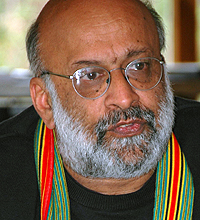|
|
 :
What is your driving passion? Your vision? :
What is your driving passion? Your vision?
FM: I have long been an activist and, as a Kenyan,
long committed to the struggle for emancipation in Africa. But in
my lifetime, I have witnessed not only the victory of political
independence sweeping the continent, but I have also witnessed in
the post independence period, the crushing of the progressive forces
within the liberation movements and the appropriation of the struggle
for emancipation by an elite bent on using the gains of independence
to fill their own pockets; I have witnessed the way in which that
class has profited from collusion with the international finance
institutions and multinationals so that most of the gains of independence
were lost during the last twenty years; I have witnessed the demise
of the credibility of socialist ideas as a results of the collapse
of Stalinism in the Soviet Union; and I have witnessed the sectarianism
amongst Pan Africanists and progressives; and I have witnessed the
romanticism attached to the nationalist project (as distinct to
the national project) divert people into becoming ready victims
of the neocolonial ruling elites.
So, the establishment of Fahamu and the publication of Pambazuka
News was a natural consequence of these experiences - to respond
to the need for nurturing the re-emergence of a progressive and
radical pan Africanist movement. And such a movement has to grapple
with its identity as 'African' - African not defined by the narrow
parochialism of geography, nor by the reactionary constructs based
on physical appearance (so called 'racial') - which falls prey to
the same constructs created by western racism. But rather, by defining
Africa in terms of its history, the aspiration for freedom and emancipation,
and therefore implicitly as being anti-imperialist.
 :
A few sea changes have taken place in our lifetimes: the end of
Apartheid, the election of an African-American US president... are
we likely to see anything that seismic in pan-africanism? :
A few sea changes have taken place in our lifetimes: the end of
Apartheid, the election of an African-American US president... are
we likely to see anything that seismic in pan-africanism?
FM: Whenever people mention the
end of Apartheid, they usually forget that 1994 witnessed not only
the first democratic elections held in South Africa, but also the
rivers of blood spilt in Rwanda where a genocide was carried out
resulting in the massacre of nearly a million people in the space
of a few months. As Mahmood Mamdani once said, 1994 was the year
the left lost its innocence: if anyone had asked at the beginning
of that decade where we were likely to witness mass bloodshed, most
of us would have pointed to Apartheid South Africa. The fall of
apartheid and the genocide in Rwanda were connected events. The
one represented the bursting of the floodgates of hope, while the
other represented despair. Each of us recognized these as events
as elements that characterise every one of our countries. They represent
our potential destinies. Both are intertwined. And that is why we
cannot speak of one without the other. Look around, the same combination
of events exist in the DRC, in Somalia, in Zimbabwe. No matter how
terrible the brutality imposed on the people, there is also inspiration
to be drawn by those who struggle against it and who concurrently
create the possibilities of another world, another future based
on justice.
Obama's victory opened the floodgates of hope
not only in the US, but across Africa. What is now important is
not to depend on Obama or any one individual, but to understand
that if our collective weight can bring about seismic changes even
in the US, then it is that collective organization that we must
rely upon to ensure that we are not betrayed.
I am certain that 'seismic' events are going to
occur in Africa in the coming period: never before have we seen
so many organise, so many who write and critique the injustices
of our current situation, so many poets, musicians, writers and
singers speak to both the personal and the political.
 :
The OAU has morphed into the AU, but do you think we will ever see
any real softening of borders. Will the East African Federation
or African Federation come to pass? Is it even desirable or useful? :
The OAU has morphed into the AU, but do you think we will ever see
any real softening of borders. Will the East African Federation
or African Federation come to pass? Is it even desirable or useful?
FM: Well, as some wit put it
recently, the AU – like its predecessor – is rather
like a trade union of despots. If we rely only on our elites to
build pan Africanism, it will remain a unity of those who make themselves
rich at the expense of the rest of us. But the rhetoric of pan Africanism
that we necessarily spout provides unique opportunities for us to
build real pan African unity from the ground up. What African
Writing is doing, what Pambazuka News, the Solidarity
for African Women's Rights, and so on – all these are the
means for developing the building blocks of pan Africanism. It is
that unity, built on solidarity and support – that is what
will lead to not just the softening of our borders (which are, in
any case, rather porous anyway), but to us being able to put our
identity as Africans above the parochial nationalism of our elite.
Just look at the way in which they thieve even from each other:
Rwanda, Uganda, Angola, Zambia, Zimbabwe and others are each vying
to carve up the wealth of the DRC. Ethiopia, as client to the USA,
has been invading Somalia. That's the kind of 'softening' of the
borders that our nationalist elites want. Building regional solidarity
is but a step towards building pan Africanism.  |
|
|
|
|











![]()
![]()
![]()
![]()

